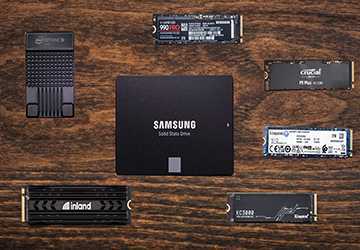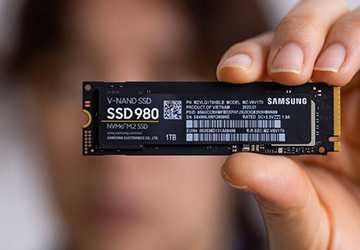Why Choose an SSD Over an HDD for Faster Performance?
In the world of digital storage, the question of comparing SSD and HDD speed often arises. Solid-state drives (SSDs) and hard disk drives (HDDs) are critical in data storage but use very different architectures. In the digital age, where speed and efficiency are desirable and vital, the advantages of SSDs must be addressed. You've wondered why your computer is experiencing performance issues, slow startup, or slow file transfers. In this case, consider the benefits of an SSD.
Advantages of Solid State Drives
The first cornerstone that we should thoroughly examine is the advantages of SSDs. SSDs use NAND-based flash memory to store data significantly faster than the magnetic storage used in hard drives. In the case of a hard drive, the spinning hard drive reads and writes data. Over time, this mechanical process can slow down your system and cause mechanical failure. On the contrary, SSDs with no moving parts are more reliable and resilient. The lack of mechanical components means failure is less likely, which helps SSDs be faster and more reliable. Additionally, SSDs are lighter and generate less heat, helping to improve overall system performance and user experience.

Speed and durability
The discussion on SSD and HDD speed will be complete once we understand speed and durability in detail. Thanks to its modern architecture, SSDs deliver speeds that hard drives can only dream of. The lack of moving parts increases speed and significantly improves durability. A laptop or desktop with an SSD can better withstand physical impact and is less susceptible to wear and tear. For those who need to travel with their device or use it under challenging conditions, this durability is not just a benefit but a vital feature.
Faster boot time and data transfer
In today's fast-paced world, no one wants to sit around and wait for their computer to wake up. This brings us to another critical point in the SSD vs. HDD speed debate: boot time and data transfer. SSDs have an immeasurable impact on improving boot times. Since they can achieve read/write speeds of up to 550 MB/s, their performance is significantly better than hard drives of around 80-160 MB/s. Whether you're launching complex software, opening large files, or just booting up your system, the speed benefits of an SSD are clear.
Energy efficiency
One aspect of SSDs that often gets attention is their energy efficiency. This is one of the significant advantages of SSDs, especially when considering laptops' more extended battery life. If you're often on the go or don't have regular access to a power outlet, the low power consumption of an SSD is an undeniable advantage. They generate less heat and use less energy, making them an environmentally friendly choice.
Cost and storage capacity
When discussing SSDs, it's essential to discuss the elephant in the room: cost. SSDs are generally more expensive than HDDs, which may be a sticking point for some. However, when you add all the benefits of SSDs, such as speed, durability, and power efficiency, the higher price makes sense as a long-term investment. Additionally, the price difference between SSDs and HDDs has narrowed, making SSDs more affordable for the average consumer.
Underlying architecture
Before we dive into the benefits of SSDs, it's essential to understand the architectural differences between SSDs and HDDs. SSDs are equipped with NAND flash memory, which requires no mechanical movement to read or write data. On the other hand, hard drives work with spinning hard drives and robotic arms to perform data operations. This essential but critical difference sets the stage for SSDs to be faster. There are no moving parts in an SSD, allowing for instant data access, which makes SSDs much quicker than their HDD counterparts.
Speed as a business advantage
The discussion about SSD and HDD speed is not just technical; It has real-world implications, especially for businesses. Time is money; the faster your computer can process and access data, the more efficiently your business can operate. Imagine storing gigabytes of data in seconds instead of minutes in broadcasting industries where every second matters, such as stock trading or medical services. The speed advantage of SSDs can directly impact productivity and profitability.

Data integrity and reliability
When delving into SSD and HDD speeds, ignoring the impact on data integrity and reliability is impossible. Since there are no mechanical parts, SSDs are less likely to cause data corruption due to physical damage or wear and tear. This makes them ideal for people who rely heavily on it.
Environmental factor
Among the many advantages of SSDs, their ability to adapt to different environmental conditions is often overlooked. SSDs are less susceptible to damage from extreme temperatures or accidental drops.
Cost-effectiveness over time
While the initial investment for an SSD may be higher than an HDD, it's essential to consider this cost in terms of long-term benefits. Over time, SSDs have become more cost-effective due to their faster speeds, lower power consumption, and better reliability.
There are many compelling reasons why SSDs are faster and more efficient, making them the storage option of choice for those looking for maximum performance. SSDs are faster, more reliable, more versatile, and, in many cases, more cost-effective in the long run. When it comes to SSD vs HDD speed, SSD is the clear winner and offers many advantages of SSD that cannot be ignored in today's fast-paced digital world.
Related Posts
- What to Look for in Gaming Monitors for Professional Gamers?
- 4 Ways Smart Home Devices Can Simplify Your Daily Routine
- 5 Amazing Apps to Organize Your Digital Life and Boost Efficiency
- Top 10 Remote Work Tools for Productive Virtual Collaboration
- How to Conduct Ethical Hacking: Penetration Testing Essentials
- How to Protect Your Computer from Viruses and Malware?